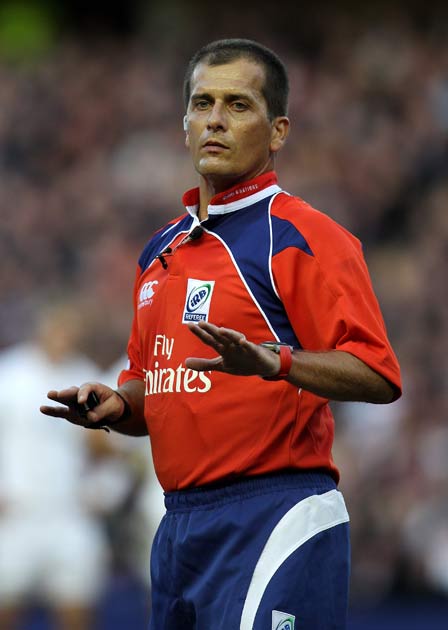Peter Bills: IRB deserve praise for punishing sub-standard refereeing

Your support helps us to tell the story
From reproductive rights to climate change to Big Tech, The Independent is on the ground when the story is developing. Whether it's investigating the financials of Elon Musk's pro-Trump PAC or producing our latest documentary, 'The A Word', which shines a light on the American women fighting for reproductive rights, we know how important it is to parse out the facts from the messaging.
At such a critical moment in US history, we need reporters on the ground. Your donation allows us to keep sending journalists to speak to both sides of the story.
The Independent is trusted by Americans across the entire political spectrum. And unlike many other quality news outlets, we choose not to lock Americans out of our reporting and analysis with paywalls. We believe quality journalism should be available to everyone, paid for by those who can afford it.
Your support makes all the difference.Believe it or not, the world of rugby refereeing is changing.
Some of the game’s authorities may still appear mired in the 19th century, but for the referees, the reality of a modern day professional sport has arrived with a rude shock.
Take the South African refereeing duo, Marius Jonker and Mark Lawrence who took charge of internationals in the recently completed autumn Test series. Both have been axed from the world referees’ panel for the 6 Nations Championship in the New Year.
The duo, heavily criticised for poor performances in the November Tests, have not even been chosen as assistant referees for the 15-match programme starting in February.
Fellow South African officials Craig Joubert and Jonathan Kaplan are included, Joubert’s two games against one for Kaplan confirming him as that country’s top referee heading into World Cup year.
Joubert will take charge of England v Italy on February 12 and France v Wales on 19 March. He will also be Assistant Referee 1 for Wales v Ireland.
Kaplan will whistle the Wales v Ireland match on 12 March and be first Assistant Referee for the France v Wales match which wraps up the tournament on March 19. Other southern hemisphere referees who will be involved include New Zealander Bryce Lawrence, who handled the recent France v Australia Test, and Steve Walsh, the Kiwi who is now on Australia’s refereeing panel.
But for the South Africans Lawrence and Jonker, there is only the reality that they have been left out in the cold. And their chances of officiating at the World Cup have clearly been damaged.
The appointments were made by the IRB Match Official Selection Committee at its meeting in Dublin last week following a comprehensive review of international referee, assistant referee and television match officials performances during the recent November Tests.
But with the Rugby World Cup 2011 in New Zealand now less than 10 months away, the accompanying message from the IRB looked gloomy for Lawrence and Jonker. Their statement said “These appointments will give the world’s top referees a further chance to cement their place in the IRB Panel for Rugby’s global showcase tournament.”
That will be tough for the axed South African pair given they are not even involved as Assistant Referees. They have both paid the price for sub-standard displays last month; Jonker in the Ireland v New Zealand game and Lawrence in the Ireland v Argentina Test.
Lawrence’s performance which included some completely wrong calls, astonished certain senior officials. At times he seemed only to be refereeing one team, Argentina, and his mistakes clearly cost them several points on the score board.
He failed to award a clear penalty try to Argentina, bizarrely rewarding Ireland for twisting the retreating scrum with a penalty to them. It was one of the craziest decisions you will ever see on an international field. He then gave Ireland another penalty when an Irish hand clearly shoved the ball back on the ground.
And another penalty which erroneously went to Ireland led to a converted try by Stephen Ferris.
As for Jonker, he failed utterly to crack down on players from both sides sealing off the ball in Ireland’s match with the All Blacks and he also allowed the Irish to collapse four scrums near their own line without sanction of a penalty try.
Yet he spent the game telling the players he was going to be tough. I wrote in my notebook at the time “Jonker’s bark is worse than his bite”.
It has become clear that refereeing of this sub-standard level will not be tolerated by the game’s authorities. And we should welcome that situation warmly. It is not before time that referees have to be made accountable for their performances in professional matches at Test match level.
In the old days, there was a kind of omerta, a code of silence, which operated. No one dared criticise a referee or suggest it would affect his future at Test level. But that was then and this is now, and plainly that old situation has been swept away.
Professional rugby will be a whole lot better for that scenario. It simply isn’t fair to the best players to allow inferior officials to take charge of their matches. If a player drops below a certain standard, he will very likely lose his place.
It’s immensely encouraging that now, it is clear, the same applies to referees.
Join our commenting forum
Join thought-provoking conversations, follow other Independent readers and see their replies
Comments